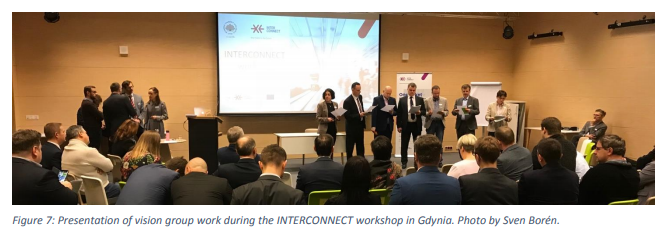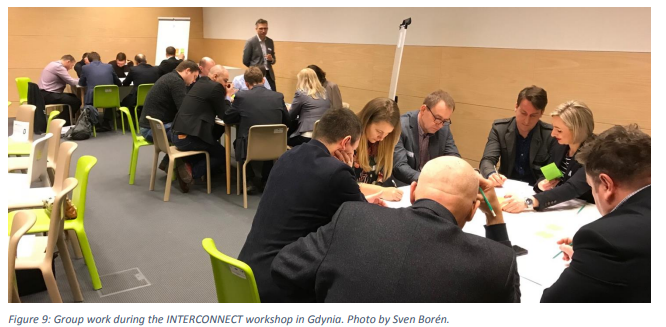
Summary of results from workshops in Gdynia.
Gdynia 22nd February, 2018: there were 53 participants at the workshop in Gdynia, including eight from the organizing team (InnoBaltica in Gdynia and BTH) and seven additional table leaders from InnoBaltica and HIE-RO in Rostock. As there where almost 80 participants enrolled, the organizing team decided to extend the group work perspectives to seven and due to the difference in signature issues (Fehler! Verweisquelle konnte nicht gefunden werden.) adjust the focus slightly (Resources bases, Spatial, Technical 1 – ticketing, Technical 2 – vehicles and infrastructure, Passenger value 1 – Accessibility and affordability of Public Transport, Passenger value 2 - additional values of Public Transport, Governance and business models). The Passenger value 1 and Governance and business models were later combined for the current reality and solutions sessions since some participants left the workshop. There was an overweight on participants from publicly funded organizations (e.g. Region of Pomorskie, Municipalities, InnoBaltica, and the Polish Transport Administration, but also a few participants from companies involved in public transport (e.g. QB-mobile, LG CNS, Indata Utilities SA, Asseco Data systems).

Vision: the session in Gdynia about co-creation of a vision of a regional and cross-border public transport system for 2040 that is well on track towards sustainability can be summarized as: All transport modes (air, biking/walking, boat, rail, road) shall be powered by alternative energy (i.e. fossil-free fuels and/or electric) and shall be integrated via physical shifting nodes with Park & Ride systems. Public transport shall be attractive, have an advantage in every aspect over individual transport, cheap, easy and pleasant to use via a simple passenger information system and have a universal carrier for tickets (e.g. mobile phone or ID card).
Current reality: this is the authors’ abridged summary of the resulting notes from all groups on the current reality in Gdynia (see appendix 3a for the complete workshop notes record). Mostly non-renewable energy is used for mobility purposes. Public transport includes buses, trolleybuses, trams, and trains. Electricity for these is generated mostly from coal, some from nuclear, and a little from biomass and flow-based resources. Lack of effective spatial planning and coordination regarding land development within municipalities, where Tricity is planned differently than surrounding rural municipalities. Public transport is getting more and more available in Tricity but is poor in rural areas. Ticketing and customer services development is hindered by failures, poor data security, too complicated services, and lack of integrated information. It is cheaper to ride a car than the train, but price is not the most important factor. It is difficult to contract many organizers, and to bridge between buses and train, as well as between regional and national borders.

Solutions: this is the authors’ abridged summary of the resulting notes from all groups on key solutions towards the vision in Gdynia (see appendix 3b for the complete workshop notes record). Increase sustainable energy share and phase out fossil fuels and consider the life cycle perspective. Increase human powered transport (walking/biking) and electric (battery/fuel cells) road (and rail) transport and charging capabilities. Reduce the need for transport ín general through effective spatial planning, by increasing work from home, through decentralization of basic services, and through increased broadband capacity. Common e-ticket solution for the whole region with the most favorable cost for mobility.
